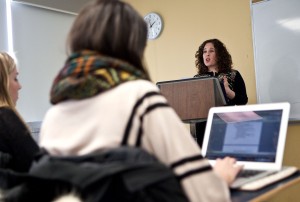Precarious work a growing issue

With an increasing amount of students about to graduate into the precarious and rapidly changing job market, one class at Wilfrid Laurier University is prepping them to face the challenge.
In “Work and Cultural Industries” on Friday afternoon, communications professor Greig de Peuter brought Nicole Cohen to talk to his seminar students about her research. The founder of Shameless Magazine, and an instructor of journalism at Laurier Brantford, Cohen was there to talk about the increased reliance on freelance work in journalism and other creative industries.
“We’re trying provide students with a picture of what they might expect while also developing their critical perspective on the power relations that are at play in the world of labour,” de Peuter said.
Bringing speakers like Cohen to Waterloo is part of de Peuter’s plan to ready students for a career that could be far more precarious than that of the generation before. “There’s a rapid level of growth of non-standard type jobs,” he added. “They don’t come with the kind of benefits and security that many people enjoyed in the past.”
Cohen may be one of the most qualified people at Laurier to talk about the challenges young people face. After her undergrad she embarked on a freelance career, hoping to produce work she believed in. While she was able to get by, she eventually went back to grad school where the pay was slightly better.
“[Precarious work] is spreading into occupations that don’t traditionally have that kind of work arrangement,” she said after her speech when asked whether precarious work is just an issue faced by those going into creative industries.
Some professionals have faced a series of short-term contracts instead of permanent employment.
Dana*, a fourth-year communications studies student decided to take this seminar after enjoying one of de Peuter’s previous classes.
“The seminar itself is a bit scary,” she laughed, noting it’s a pessimistic, though realistic view of the job market. However, Dana’s not deterred from pursuing a career in media. The class also taught her that she could use social media tools to sell her personal brand online.
Cohen doesn’t see the future as all doom and gloom; in fact, she sees a lot of reasons to remain positive about the state of media production.
“Derek Finkle’s [literary] agency is producing ebooks and cutting out publishers entirely,” she said. She thinks that online fundraising tools like Kickstarter and IndieGoGo may allow creators to gain further control over their work.
De Peuter also wants his students to understand the value of their own work.
“[I want them to take away] a commitment to not sell themselves short,” he said. “I hope they don’t devalue their own contribution.”
*Last name withheld at Dana’s request.

